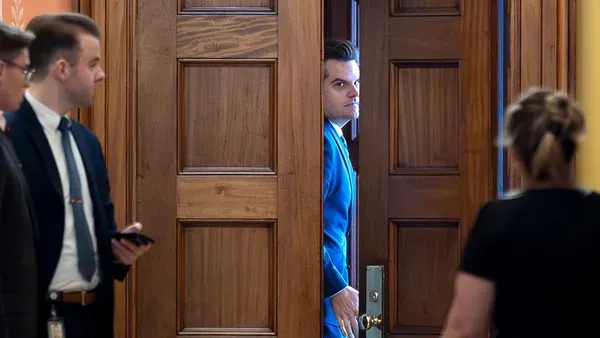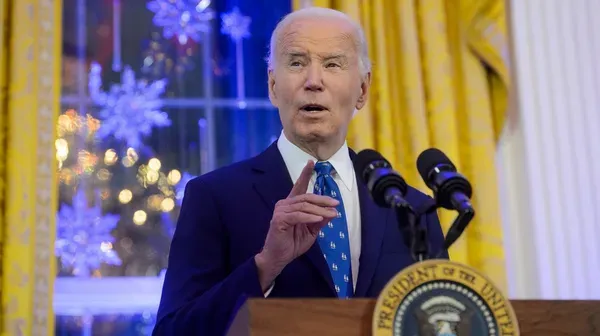
Nov 6
How is Trump's Second Term Likely to Impact Queer Americans?
Kilian Melloy READ TIME: 4 MIN.
Vice President-elect JD Vance wasn't wrong when he declared that "normal gay guy[s]," as he put it, "just want to be left the hell alone..." But with Trump headed back to the White House, that's probably not going to be the case – not for the average "normal gay guy," and certainly not for transgender Americans.
Everything from marriage equality to the ability of LGBTQ+ Americans to access health care could be on the chopping block, UK newspaper The Guardian observed in an article published last September that recalled the former president – and now president-elect – has "pledged to rescind federal LGBTQ+ nondiscrimination policies, which could mean a loss of protections in housing, healthcare, employment, education and a range of federal programs."
Moreover, Trump "has promised new credentialing for teachers to 'promote positive education about the nuclear family, the roles of mothers and fathers,'" the Guardian relayed, before noting that "The Republican platform calls for advancing a 'culture that values the sanctity of marriage'"... and not marriage between any two committed individuals, but, as the Heritage Foundation-authored Project 2025 (a blueprint for gutting the federal government and remaking American society) lays out, "stable, married, nuclear families" that reflect "biblically based" "heterosexual, intact marriage".
In a similarly grim forecast of what another Trump term in the White House would mean, the Washington Post pointed out (also in an article from this past September) that "the first Trump administration fought efforts to extend anti-discrimination laws to cover sexual orientation, and social conservatives are eager for Trump to pick up where he left off."
"Trump is also expected to try to appoint more conservative judges on the federal bench who could influence future landmark decisions on LGBTQ issues," the Post added.
Even as Project 2025 outlines an America that is vastly different from the one that exists today, Trump's own "Agenda 47" paints a picture of how the president intends to attack transgender Americans, who have already faced a record-breaking barrage of state laws in recent years.
"Project 2025," the Guardian article noted, "equates trans-inclusive reading materials to 'pornography,' suggesting teachers and librarians should be imprisoned as sex offenders if they promote 'transgender ideology.'"
The article goes on to add that "in recent years, there's been a growing movement to criminalize [medical] treatments for trans youth, pushed by the same groups promoting anti-abortion laws forcing patients to cross state lines for procedures."
Indeed, young people across the LGBTQ+ spectrum could be the most harshly affected by laws and policies resulting from a second Trump term. "Advocates fear Trump's anti-LGBTQ+ agenda would undo the Biden administration's foster care regulations meant to ensure queer and trans youth are placed in supportive homes," the Guardian said. "Brandon Wolf, press secretary of the Human Rights Campaign, a national LGBTQ+ group, said that rollback would endanger kids' lives, noting survey data suggesting half of trans and non-binary youth have considered suicide."
While some of the president-elect's likely actions – including a reinstatement of the ban on openly transgender military servicemembers – could be accomplished through executive orders, others would need congressional approval.
Here, too, queer Americans face bad news: Republicans have won a majority of the seats in the Senate, and, as of this writing, are in striking distance of preserving a majority in the House of Representatives as well.
The courts proved a bulwark against many of Trump's first term efforts, but that may be less true this time around.
"A detailed memo the American Civil Liberties Union (ACLU) released in June argues many of Trump's proposals are illegal or unconstitutional," The Post article noted. "The group's lawyers see many opportunities to push back but also say it's hard to predict how courts might rule, especially after the former president's success pushing the federal judiciary to the right."
Moreover, the Supreme Court – which less than a decade ago affirmed the right of gay and lesbian couples to marry, ushering in marriage equality across the country and replacing what had been a patchwork of rights that varied from state to state – has long signaled an interest in revisiting marriage equality, much as the Court revisited, and rescinded, the reproductive freedoms of women.
The Biden administration oversaw the passage of the Respect for Marriage Act, which offers some level of protection for marriage, but that right could still be atttacked at the state level if the Supreme Court abolishes a Constitutional protection of same-sex marriage.
Deputy Director of the ACLU's LGBT & HIV Project, Leslie Cooper, noted to the Washington Post that Americans living in states with strong Democratic leadership who believe they will be insulated from attacks on LGBTQ+ equality need to reassess that idea.
"I think a lot of folks feel if they live in a so-called blue state, they're safe from whatever impact a second Trump administration can have, and that's just not true," Cooper warned.
Adding that the people associated with the president-elect have been "saying what they would try to do" to queer Americans, Cooper said, "I think we should believe them that they mean it."
Kilian Melloy serves as EDGE Media Network's Associate Arts Editor and Staff Contributor. His professional memberships include the National Lesbian & Gay Journalists Association, the Boston Online Film Critics Association, The Gay and Lesbian Entertainment Critics Association, and the Boston Theater Critics Association's Elliot Norton Awards Committee.







